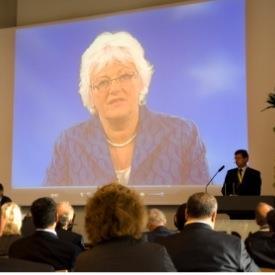
European food markets, including fresh produce wholesale and retail markets, have a major role to play in encouraging consumers across Europe to eat more fruit and vegetables and thereby improve their health.
That was the stand-out conclusion of a speech delivered by the European Commissioner for Agriculture and Rural Development Mariann Fischer Boel on the opening day of last week's 26th annual WUWM Congress, held in the Danish capital Copenhagen and hosted by Grønttorvet København (Copenhagen Wholesale Market).
Speaking live via video link to the 150 assembled delegates from 30 different countries, Ms Fischer Boel also explained how the EU was helping to tackle poor health and obesity by backing the new schools fruit scheme, for which some €90m has been earmarked for investment by the European Commission, to be matched by individual member states.
'Children and youngsters in the European countries eat far too few fruit and vegetables,' she explained. 'The EU and the individual governments have a direct responsibility to provide children and youngsters with healthy eating habits, which in turn will secure them a healthy life. That is why we are now launching the European School Food Programme, where fruit and vegetables will play an important role.'
She added: 'It is my hope that all the European governments will back this initiative and make sure that the children and youngsters receive healthier food in their schools.”
The opening day's keynote speaker was Henning Otte Hansen, senior advisor at Copenhagen Business School and an international expert on global food production. Focusing on the recent food crisis, Mr Hansen suggested the real crisis lay not in availability of food worldwide but in its fair and equal distribution.
'There is enough food in the world,' he stated. 'The real debate should be about the global division of foods and welfare. The food crisis is a problem, particularly in under-developed countries. There is enough food, but the price levels touch upon the welfare and division problem, which is a very central point in the discussion.'
According to Mr Hansen, global food supply has begun to rise once again, with the first signs of a drop in the prices now being seen. 'Farms are cultivating larger acres of land, they are using more fertilisers and yields are growing. Globally, we now have the capacity to produce food for about 12bn people. This means that the global food crisis will only last one or two more years,' he told delegates.
Another central theme of Mr Hansen’s speech was globalisation, a trend which he felt would not be curtailed by either the food crisis or recent problems with the energy economy. 'Cross-border trade will grow, we will experience more cross-border mergers and more international investments will be made as well as more outsourcing of food production,' he predicted. “Particularly in western countries, we will become increasingly dependent on foreign foods. We will become increasingly more global consumers, demanding global products.'



